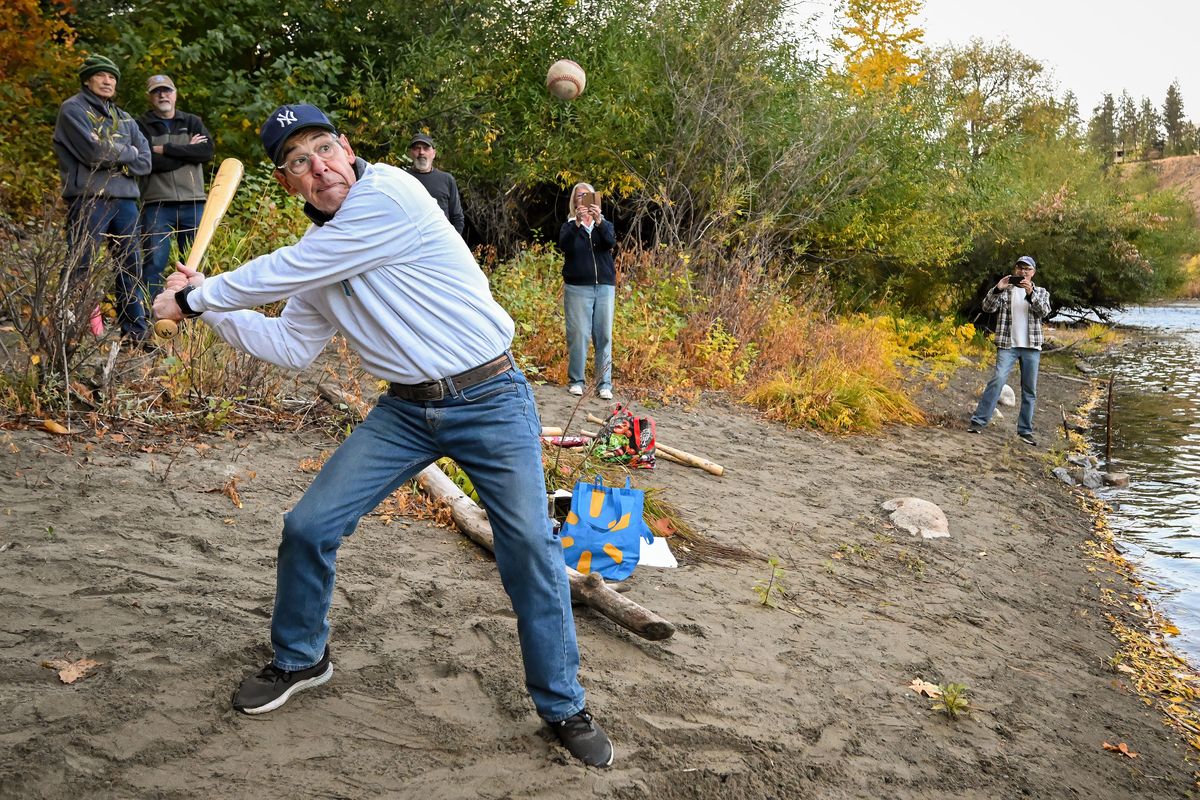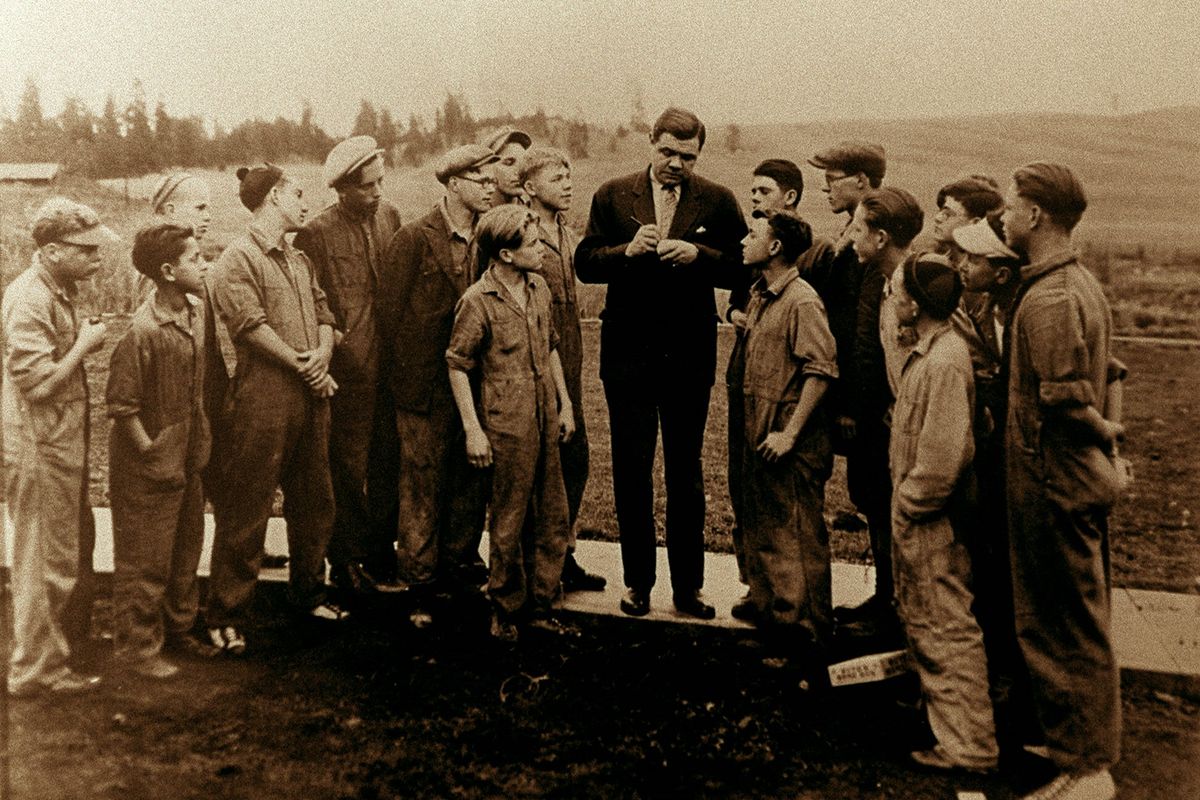Spokane baseball nerds swing to honor Babe Ruth’s visit
Babe Ruth, who was known as “America’s most famous orphan,” signs baseballs for children at the Hutton Settlement in 1924. (The Spokesman-Review photo archive)
They whiffed, scuffed, dinked and sometimes connected Thursday night in honor of the day that the Babe came swashbuckling into the Lilac City and homered during an exhibition baseball game.
That barnstorming visit by George Herman “Babe” Ruth, and his fellow New York Yankees outfielder Bob Meusel, occurred exactly 100 years ago on Thursday.
The carnage of releasing old baseballs to their watery graves in the Spokane River started 17 years ago as the brainchild of baseball junkie Dave Jackson, a founding board member of Hoopfest and teacher at Lewis and Clark High School.
Jackson said he learned about Ruth’s 1924 visit when he read about it in a book published by the late Tony Bamonte.
Jackson said he remembers as a child in the 1960s the old Natatorium Park before it was torn down. It’s the site of Sans Souci West mobile home park.
Originally called Twickenham Park, officials later renamed it Natatorium because of the popularity of its indoor swimming pool.
The city’s first professional baseball team was initiated on the park’s grounds and the swimming pool opened there in 1893, according to History Link.
As for the 1924 visit by Ruth, a clipping from The Spokesman-Review indicated that Ruth smacked three doubles, a single and a home run during his plate appearances at Nat Park.
“Whenever Ruth stood still for a few minutes he was surrounded by pools of kids who streamed from stands and fences,” the article stated.
Meusel smacked a home run in the sixth inning. Ruth hit a long fly ball in the eighth inning that Meusel caught at the fence for an out.
But Ruth got another at-bat.
“After about six balls had been called, swinging with his easy grace, so surprising in a man of his elephantine proportions, he knocked a high one over the center field sign,” the article stated. “The crowd stood and cheered. All kids grinned. There was the light of heaven in their faces. They had seen Babe Ruth hit a homer.”
A Seattle Post -Intelligencer reporter noted that Ruth had dined on wild duck and buffalo during his train visit to Spokane.
“I’m going to get me a flock (of) buffalo when I get back to my New England farm,” the paper quoted Ruth as saying after the Spokane game. “I ought to hit a hundred home runs next year on a buffalo diet.”
Jackson, the LC teacher, said the game had a few odd rules, like allowing Ruth and Meusel chances to bat every inning despite where they were in the lineup.
“We celebrate this day, which is the 100th anniversary that the Great Bambino, the Sultan of Swat, hit his Spokane smash to win the game on Oct. 17, 1924,” Jackson told a gathering of 12 folks near the river Thursday evening.
Jackson said he became a baseball junkie because of his father, Charlie Jackson, who died earlier this year at the age of 93. Charlie Jackson played in the minor leagues for the St. Louis Cardinals organization.
“The first picture my parents took of me, they put me in my dad’s baseball glove,” Jackson said. “He gave me the glove bug.”
As a result, Jackson said he has hundreds of baseball gloves, some of which date back to Ruth’s playing days.
“I had a Babe Ruth bat,” Jackson said.
Jackson said he had moved to a home on Summit Drive about 1½ years before learning of Ruth’s visit.
“I got my crazy friends together and said, ‘Let’s go celebrate the Babe.’ We gathered up a bunch of baseballs and started this 17 years ago,” Jackson said.
While the goal or the event Thursday was to hit a baseball over the river, which has only been accomplished a handful of times, including twice by Jackson’s son, Adam. But the river had no historical connection to Ruth.
While Ruth hit a home run, and reportedly hit several foul at Nat Park, he did not hit them into or over the Spokane River, Jackson said.
“But Babe said it was the longest home run he’d ever hit in his life. So the crowd rushed the field and game was over in the eighth inning. He would have been right there,” Jackson said pointing above him. “People who really knew baseball said he was the greatest of all time.”
Jackson said it’s Ruth’s lore that he’s trying to celebrate.
“He swung a gigantic bat, the drinking, he was kind of overweight,” Jackson said of Ruth. “To do what he did with all the RBIs and all the games played and all the wins … he was probably the most recognized figure, or face or celebrity on planet earth in 1924.”
On Thursday, several folks took hacks and connected in various forms of success.
Jackson’s son, Adam, hit two across the river. One cleared the lower brush and landed beyond and splashed down in a pond. The other fell into the rocks on the far shore.
Jackson and Terry Schmidt, who is also a co-founder of Hoopfest, had the contestants read a quote from Ruth, sign the wooden bat Schmidt made for the event, take a shot of rye whiskey and then swing for the opposite bank.
Matt Filippini, another teacher at LC, crushed the first ball to reach the other side of the river.
Stan Smith, 75, had several whiffs and he openly questioned whether he would connect. “Can I bunt?” Smith asked to laughter. Jackson responded: “That may be the best line ever.”
Smith then connected with a ball and sent it three-quarters of the way across the river. “It felt good,” Smith said. “I used to play ball back in the day. I hadn’t swung a bat in 50 years.”
As for Ruth’s visit, Jackson said Ruth and other famous players would barnstorm into towns by train and play exhibitions to raise money. They would pocket some of the cash and donate the rest.
During his visit to Spokane, Ruth, an orphan himself, had heard about the Hutton Settlement in Spokane Valley while he was in Vancouver, British Columbia. The settlement was founded by Levi Hutton in 1919, the self-supporting settlement would never turn away a child without a home.
During Ruth’s trip, he visited the Hutton Settlement campus. Not only did he play pickup baseball at the sandlot diamond in the front of the grounds, he also ate lunch with the girls who lived there in their dorms.
The Babe
According to historical archives, Ruth and Meusel visited Spokane in 1924 just weeks after finishing the season on Sept. 27 with a 4-3 loss to the Philadelphia Athletics. The Yankees finished second after winning the 1923 World Series.
For the 1924 season, Ruth won the batting title with an .378 average. He also hit the most home runs with 46 and he 124 RBIs. He had 200 hits and 141 walks and scored 143 runs in 153 games.
Meusel also had a stellar year for the Yankees. He batted .325 and had 12 home runs, which was second most for the Yankees behind Ruth.
Meusel also tied Ruth for the most RBIs with 124 and added 26 stolen bases to lead the team, according to historical Yankees archives. That year Ruth stole nine bases, but he was caught stealing 13 times.
Meusel later joined Ruth to become part of what became known as ”Murderer’s Row” that included hall of famer Lou Gehrig. It was during that 1927 season in which Ruth hit his monumental 60th home run, a record that stood 34 years until fellow Yankee Roger Maris hit 61 home runs in 1961.
The Yankees in 1927 notched 110 wins, won the American League pennant by 19 games and swept the Pittsburgh Pirates in the World Series. It remains one of the most dominant baseball team records of all time.
Jackson said most people forget that Ruth got his start in baseball as a pitcher and that he won three championships with the Boston Red Sox. For his pitching career, Ruth won 94 games and finished with a career 2.28 ERA.
The Red Sox sold his rights in 1919 to the Yankees in a transaction that started 86 years of futility for Boston that became known as the ”Curse of the Bambino.”
Ruth played 22 years. His last year with the Yankees was in 1934 and he retired the next year after a short stint with the Boston Braves.
In 1946, he was diagnosed with a type of cancer in the back of the throat called nasopharyngeal cancer, and he died two years later at age 53.
In his prime, Spokane got to witness just a bit of that Ruth dynasty, thanks to a train stop in 1924.
“It was almost like he was a cartoon character,” Jackson said of Ruth. “But he was true and legit. He’s still a bigger-than-life guy.”
An earlier version of this story misspelled the name of Bob Meusel.


